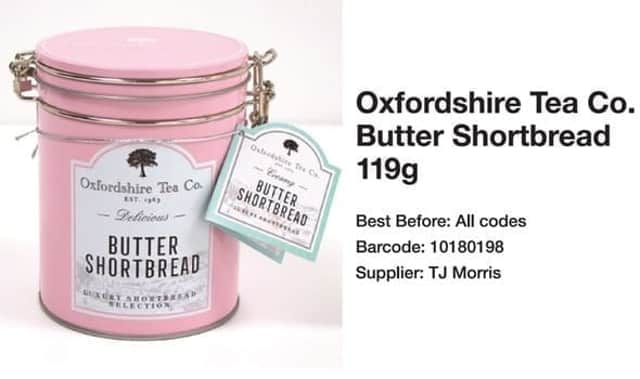These shortbread biscuits have been recalled over serious allergen fears


The Oxfordshire Tea Co has recalled its butter shortbread - sold exclusively at Home Bargains - over fears it contains allergens.
In a customer notice, TJ Morris, which owns the Oxfordshire Tea Co, said the product had been incorrectly labelled as ‘gluten free’ when it may contain wheat.
Which biscuits are affected?
Advertisement
Hide AdAdvertisement
Hide AdThe only TJ Morris product thought to be affected is its Oxfordshire Tea Co Butter Shortbread.
Best before: all datesBarcode: 10180198Supplier: TJ Morris
What you need to do
If you have bought the butter shortbread and have a wheat allergy or an intolerance to it, the Food Standards Agency advises you not to eat it. Customers can return it to the store where they bought it for a full refund.
Anyone with questions or concerns can contact Home Bargains by calling 0151 530 2920.
Alternatively you can email: [email protected]
What is Coeliac Disease?
Coeliac disease is a cheeky auto-immune condition where the body’s defence system attacks substances inside gluten because it mistakes them for a threat.
Advertisement
Hide AdAdvertisement
Hide AdBecause of this, eating food with gluten in it can cause a range of very unpleasant digestive symptoms for people with coeliac disease. These can include:
DiarrhoeaAbdominal painBloatingWindIndigestionConstipation
Food product recalls explained
According to the Food Standards Authority, if there is a problem with a food product that means it should not be sold, then it might be 'withdrawn'. This means that the product is taken off the shelves so that no more of it can be sold.
The FSA might also decide to ‘recall’ the food, meaning that it is withdrawn from shelves, and customers are also asked to return the product to the shop where they bought it.
The FSA issues Product Withdrawal Information Notices and Product Recall Information Notices to let consumers and local authorities know about problems associated with food.
In some cases, a 'Food Alert for Action' is issued. This provides local authorities with details of specific action to be taken on behalf of consumers.